Which Documents Should You Shred at the End of the Fiscal Year?

Spring cleaning should happen at the end of every fiscal year. While holding on to documents and records may seem like the wise thing to do, it can open you up to security issues like identity theft, non-compliance (with local, state, or federal laws), and confidentiality concerns.
Below are five types of documents you should consider shredding once they’re no longer worth storing. Remember that it’s essential to hang on to some records for a certain number of years before shredding them, so pay close attention to if enough years have passed.
Bank Statements and Pay Stubs
Keeping bank statements and pay stubs for the fiscal year is necessary, but it’s best to shred these documents once the year is up. Financial records like these contain sensitive data, such as social security numbers, birthdates, account numbers, and signatures. Leaving them sitting around for anyone to scoop up can become a liability very quickly.
W-2 and W-4 Forms
Businesses should keep all W-2s and W-4s on file for four years in case of an audit. After this time, though, North Dakota companies should shred these documents properly. It doesn’t make a difference if the records are for current or former employees; they contain confidential information like tax ID numbers and social security numbers, making them valuable to identity thieves.
I-9 Forms
These tax documents confirm an employee’s identity and, by law, must be kept for three years or one year after terminating the employee. Once the appropriate amount of time has elapsed, the documents need to be safely and securely destroyed. If they aren’t, you’re hanging on to what equates to a road map to stealing someone’s identity.
Tax Records
A business must file a lot of documents with the IRS each for tax purposes. Because the IRS has the right to perform an audit up to seven years after a business filing deadline, it’s best to keep these documents for that amount of time but then shred them. As the business owner, you have three years to amend a tax return, so destroying tax records before that time has passed is not in your best interest.
Credit Card and Utility Bills
It’s easy to overlook these two items amidst all the tax documents and bank statements. Still, credit card bills and utility bills also contain sensitive information that you don’t want falling into the wrong hands. Generally, you can shred these bills after you have confirmation of payment. However, if the statements directly connect to your tax returns, hang on to them for as long as you should keep your tax return documents (anywhere from three to seven years).
Shred It with SEAM Services
Does your North Dakota or South Dakota business have piles and piles of data-sensitive documents you need to have shredded safely and securely? If you’re looking to free up storage space in your office right now or at the end of the fiscal year, you can count on SEAM Services to make it happen.
Our services can destroy more than just documents, and we can come to your place of business with our mobile on-site data destruction equipment. That way, you witness the shredding of your paper documents, hard disk drives, flash drives, and more. Contact us for more information.
SEAM provides IT recycling and data destruction services including onsite shredding and hard drive wiping to South Dakota, North Dakota, Minnesota, Iowa, and Nebraska.
Schedule a pickup or contact us for more information.





